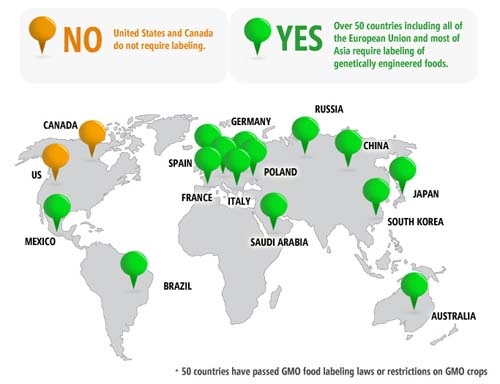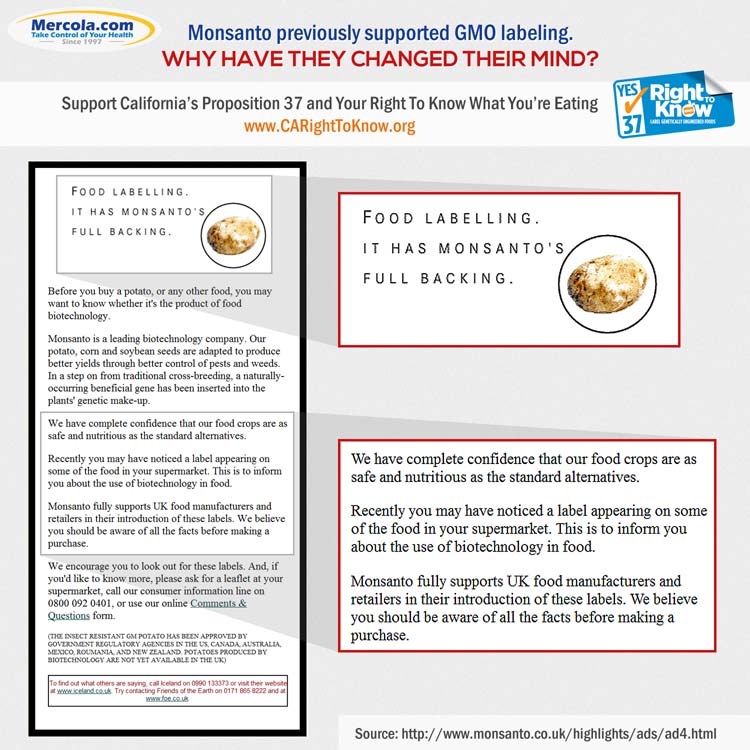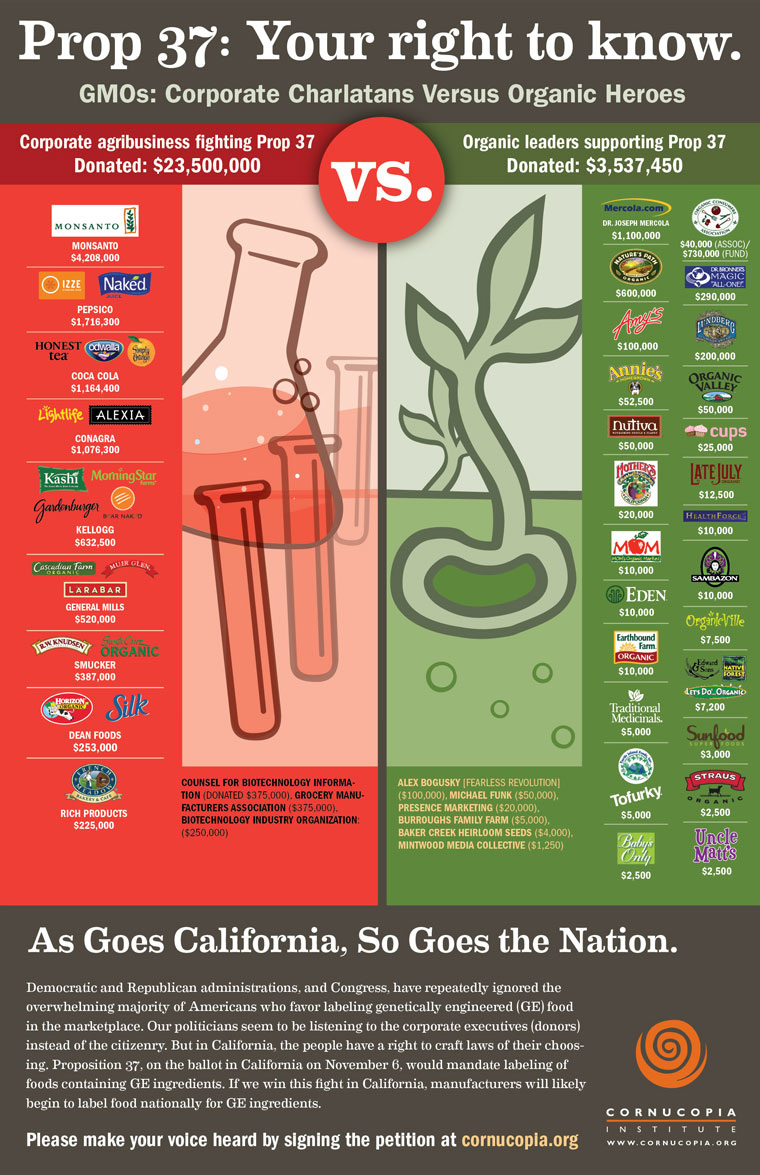|
Visit the Mercola Video Library September 13 2012 By Dr. Mercola Just how much is it worth to chemical giants like Monsanto to make Proposition 37 – a bill that would require labeling of genetically engineered food – go away? Enough to contribute $4.2 million so far to a campaign to defeat it, that's how much. Monsanto's not the only major chemical company hoping to defeat this measure. Dupont ($1.27 million) and Dow Agro ($1.18 million) are contributing millions to fight our right to know what's in the food we eat. Why are You Being Kept in the Dark About What's in Your Food?Monsanto is the acknowledged leader responsible for the genetic changes in our food system – the mother of biotechnology in agriculture and creator of other products that have included Agent Orange1, PCBs2, DDT3, Recombinant Bovine Growth Hormone (rBGH) and aspartame4. How Monsanto became such a ringmaster is crucial to understanding why Americans are not allowed to know if their food has been genetically engineered by simple labeling like 50 countries around the world do, including Russia, China and the entire EU. So why are Americans kept in the dark? Monsanto is not just an expert in manipulating genetic structures, they are also experts in manipulating people. Monsanto influenced President Ronald Reagan's administration back in 1986 to assure genetic engineering would be kept away from the public forum. Monsanto's power has been further enhanced through each administration, adding more influence with each federal appointment. Even in the past year, Monsanto has directly supported at least 65 candidates for federal office in the 2012 elections, with significant dollars "donated" to the chairs and leadership of the House and Senate Ag Committee. Who's Really in Charge of GE Food Safety?Who is ensuring the safety of Monsanto's products? Not Monsanto. "Monsanto should not have to vouch for the safety of biotech food. Our interest is in selling as much of it as possible. Assuring its safety is the F.D.A.'s job" – Philip Angell, Monsanto's director of corporate communications. "Playing God in the Garden" New York Times Magazine. And neither is the US FDA...The FDA has not conducted a single independent test of any genetically engineered product. The agency simply accepts the testing completed and provided by the biotechnology corporations like Monsanto. The FDA makes this very clear, "Ultimately, it is the food producer who is responsible for assuring safety" – FDA, "Statement of Policy: Foods Derived from New Plant Varieties" (GMO Policy), Federal Register, Vol. 57, No. 104, p. 229 Does that make you a bit concerned about the integrity of our food safety system? There are many variables to consider with these genetically engineered foods. GMOs are living, synthetic organisms that can reproduce and proliferate, they can mutate and migrate. Can we trust a small group of chemical companies to control and monopolize our food and restructure the world's food system? The USDA has implemented a new fast-track process that is a part of efforts by the Secretary of Agriculture, Tom Vilsack5, to "transform the USDA into a high-performing organization that focuses on its customers" – namely big biotech bullies like Monsanto, Dow, Dupont, BASF, and Syngenta. The USDA recently posted 12 new genetically engineered (GE) crop submissions for public comment, and nine are under the new fast-tracked process. It's no coincidence that Vilsack was named Governor of the Year by the Biotechnology Industry Association in 2001... Former United States Secretary of Agriculture (served from 1995 until 2001), Dan Glickman, was a big promoter for biotechnology and pushed for these products to be sold in Europe to secure profitable exports. He concluded after his USDA departure, "What I saw generically on the pro-biotech side was the attitude that the technology was good and that it was almost immoral to say that it wasn't good because it was going to solve the problems of the human race and feed the hungry and clothe the naked. And there was a lot of money that had been invested in this, and if you're against it, you're Luddites, you're stupid. There was rhetoric like that even here in this department. You felt like you were almost an alien, disloyal, by trying to present an open-minded view on some of the issues being raised. So I pretty much spouted the rhetoric that everybody else around here spouted; it was written into my speeches." "FDA Shouldn't Order Costly GMO Labels Just to Satisfy Scientific Illiterates"Arrogant biotech scientists make alarmingly dishonest blanket statements suggesting all scientists agree that genetically engineered foods are beneficial to us and our environment. I invite you to read GMO Myths and Truths if you'd like to completely debunk that lie. A recent article by a biotechnology company consultant recently wrote an article entitled, "The FDA Shouldn't Order Costly GMO Labels Just to Satisfy Scientific Illiterates."6 In Europe, Monsanto supports labeling genetically engineered foods because the people demand it. In fact, after realizing how much it had upset the European public by attempting to force these products upon consumers, Monsanto ran ad campaigns in support of labeling to save face. One ad proclaims, "You have the right to know what you eat, especially when it's better... We believe that products that come from biotechnology are better and that they should be labeled." In an interview with State of the World Forum, News Team journalist Alastair Thompson asked Monsanto CEO, Robert Shapiro about the consumers demand for labeling GMOs. Shapiro said, " ...it is not my role, or Monsanto's role, to decide these things. It is society's role to decide those questions after appropriate debate." "So you are open to labeling being introduced then?" Shapiro answered: "Yes. Of course." Monsanto spokesman, Gary Barton also clearly stated, "There's a total misperception that we're against labeling." Genetically engineered products should proudly display a simple statement acknowledging this technology. These multinational businesses should have no problem promoting evidence to convince consumers of their many benefits. Surprisingly, Monsanto appears to contradict those principles in the United States, where the company says it doesn't support labeling and will spend millions to ensure this information is concealed from consumers. That's because the current policy in America is one where the FDA and U.S. Department of Agriculture operate as both regulator and marketer of biotechnology. Most people don't realize that our own USDA co-patented the "Terminator" technology that makes seeds sterile. Monsanto loves to proclaim that genetically engineered foods will save the environment and feed the hungry, apparently with a very heavy hand. "People will have Roundup Ready soya whether they like it or not" – Ann Foster, spokesperson for Monsanto in Britian, as quoted in The Nation magazine from article "The Politics of Food" by Maria Margaronis. India Bans Genetically Engineered Bt Cotton SeedsThe Indian state Maharashtra has now banned the sale and distribution of Monsanto's genetically modified Bt cotton seeds7 for obvious reasons. India recently released an analysis from the Parliamentary Standing Committee on Agriculture regarding Monsanto's Bt cotton performance in the country. According to the report: "The Bt cotton has aggravated agrarian distress rather than helped farmers. The irresponsible hype and promotion of this technology has cost many farmers their lives and cannot continue." A thorough investigation into the Bt cotton collusion has been ordered from the beginning, including a review of studies showing inexplicable changes in the organs and tissues of Bt cotton seed-fed lambs. India has suffered greatly due to false promises of biotechnology. I traveled to several locations in India back in 2008 to see the suffering first hand and to hear the tragic stories of farmers consuming the very herbicide that was supposed to help them harvest high-yielding genetically engineered crops. Instead, these farmers were burdened with great debt to purchase these products, and eventually would lose their land when the promised yield never came, and ultimately would take their own life. Yet we're led to believe these patented, synthetic life forms are supposed to be the salvation for impoverished farmers and starving people. GMOs can't even feed America's inner cities, much less Africa, Pakistan and the rest of the starving population. This is a problem of politics, distribution, and equity that Monsanto simply dismisses in an attempt to control the world's food supply. Monsanto's Utopian Future = Environmental DisasterMonsanto was prosecuted on corruption charges in Indonesia. The biotechnology giant said it would pay $1.5 million to settle charges of bribing Indonesian officials. The company made payoffs to officials over six years, according to a complaint filed by the Securities and Exchange Commission, including a $50,000 cash payoff to Indonesia's environment ministry official. You see, Monsanto will do whatever it takes to accomplish their ultimate goal. In January, 1999, a representative from Arthur Anderson, LLP explained how they had helped Monsanto design their strategic plan. Monsanto executives told the consulting firm what their ideal future would look like in 15 to 20 years. The executives described a world in which 100 percent of all commercial seeds would be genetically modified and patented; a world in which natural seeds would be virtually extinct. "What you are seeing is not just a consolidation of seed companies, it's really a consolidation of the entire food chain" –Robert Fraley, co-president of Monsanto's agricultural sector, in the Farm Journal. Quoted in: Flint J. (1998) Agricultural industry giants moving towards genetic monopolism.Telepolis, Heise. Why No One Should Overlook Monsanto's Sordid PastMonsanto has had a controversial past that had polluted the land and contaminated virtually every human and animal on earth. According to a former Monsanto vice president, "We were despised by our customers." Monsanto's chief European spokesman admitted in 1999, "Everybody over here (Europe) hates us." It appears that the rest of the world is catching on. Monsanto has gone so far as to even begin brainwashing our children, creating a Biotechnology Basics Activity Book.8 The book states: "This is an activity book for young people like you about biotechnology – a really neat topic. Why is it such a neat topic? Because biotechnology is helping to improve the health of the Earth and the people who call it home." The book goes on misleading kids with statements like: "Reduces Blindness," and "creates products with reduced fat." Not covered in the book however, is any explanation of how for nearly 40 years, while producing PCBs at a local factory, Monsanto Co. routinely discharged toxic waste into an Anniston, Alabama creek and dumped millions of pounds of PCBs into landfills. Thousands of Monsanto documents marked "CONFIDENTIAL: Read and Destroy" show how they hid their transgressions that went on for decades. One internal memo concluded: "We can't afford to lose one dollar of business." A life-long resident of Anniston, Alabama revealed, "Monsanto did a job on this city. They thought we were stupid and illiterate people, so nobody would notice what happens to us." Monsanto created virtually all of the PCBs in the U.S. and is a "potentially responsible party" at 93 sites where hazardous waste has been identified by the U.S. Environmental Protection Agency. A former Anniston plant manager for Monsanto, William Papageorge, was asked in a deposition whether Monsanto officials ever shared their knowledge about PCB hazards with the community.9 "Why would they?" he replied. Monsanto "Learned its Lesson" from Successful EU Refusal of GE ProductsIn a 2010 article in the International Journal of Communication, titled "Monsanto Discovers New Social Media," Wilhelm Peekhaus writes:10 "Monsanto learned some time ago about the value of the Internet in influencing the message being disseminated publicly about genetically engineered crops. The company's director of communications, Philip Angell, admitted to The Wall Street Journal that 'maybe we weren't aggressive enough. …When you fight a forest fire, sometimes you have to light another fire.' Monsanto executives identified the Internet as the medium that had facilitated the rapid and expansive uptake of European protest against its products. Jay Byrne, former Monsanto director of Internet outreach, counseled colleagues beyond the company to 'think of the Internet as a weapon on the table. Either you pick it up or your competitor does, but somebody is going to get killed.'" GE Crops – the Largest Experiment on EarthMonsanto's business practices are certainly one concern we need to take into account when it comes to our food supply. But what about the science – will Monsanto's monoculture prevail and thrive or cause massive problems for our future agriculture system? The National Academy of Science concluded after a fungus spread through America's corn crop: "The key lesson is that genetic uniformity is the basis of vulnerability to epidemics." Back in 1993, Monsanto issued statements to the USDA regarding the potential for the development of weed resistance, ensuring that "glyphosate is considered to be an herbicide with low risk for weed resistance" and "it is highly unlikely that weed resistance to glyphosate will become a problem as a result of the commercialization of glyphosate-tolerant soybeans." Over 20 different weed species have now developed glyphosate resistance and the risks are not limited to the plants. The Bt gene that is introduced into a majority of the American corn and cotton dramatically catalyzes the resistance of insects. At least eight species of insects have already developed Bt resistance. "We're not going to make this go away," said University of Minnesota professor Bruce Potter, a pest management specialist. "We're stuck with managing this problem."11 We are performing an experiment on a world scale whose consequences are unknown and can only be imagined. Dr. Charles Benbrook was a former agricultural staff expert on the Council for Environmental Quality at The White House, Executive Director of the Subcommittee of the House Committee on Agriculture, and Executive Director of the Board on Agriculture of the National Academy of Sciences. He has stated,12 "The scope of the fraud, if you will – I know that's a harsh word – the scope of the fraud that's being sold to the American public about this technology is almost unprecedented. They have no control over where in that cell or where in that plant's genome the new genetic material gets lodged and expressed. Because they don't have control over that, they have absolutely no basis to predict how that trans-gene, the new genetic material, is going to behave in the future as that plant deals with stresses in its environment – whether it's drought, too much water, pest pressures,imbalances in the soil, or any other source of stress. They just don't know how it's going to behave. They don't know how stable that expression is going to be, or whether the third generation of the plant is going to behave just like other generations. They don't know whether the promoter gene, which has been moved into the plant to turn on the new piece of genetic material, will influence some other biosynthetic pathway that's in the plant, turning on some natural process of the plant when it shouldn't be turned on, or turning it off too soon. There are all sorts of things that they don't know. The biotechnology industry says, 'Well, if one of these genetically engineered plants kind of goes crazy, it's probably not going to be fit and it won't survive. It won't last in the environment. Nature will select out against it.' For somebody that works for a public institution to make that point, it really borders on libelous. It's such a violation of the public trust for scientists who understand this stuff to be so divorced from fairness in talking about the technical issues to an audience of non-scientists. It's really scandalous, in my opinion." Without Choice, How Can There Be Trust?Former Monsanto lawyer and current FDA Food Czar Michael Taylor wrote the policy of substantial equivalence, ensuring biotech companies would not need to label their products as genetically engineered. This would appear to contradict Taylor's opinion in a 2003 Nature Biotechnology article13 where he states: "The United States and the major US agbiotech companies have positioned themselves in the eyes of many as opposing choice by virtue of their aggressive promotion of the technology, their opposition to labeling worldwide, and most recently by resorting to trade remedies to force Europe's hand. Nothing could be more destructive of trust in the technology and its promoters than for them to be on the wrong side of the choice issue. They should change their position and put themselves on the side of empowering choice in whatever way works in any given country." Even Presidential candidate Obama promised to label genetically engineered foods – a promise we're still waiting for him to fulfill even after a full term in the Oval Office. After moves by France to ban a Monsanto GM corn variety, the US ambassador, Craig Stapleton, a friend and business partner of George W. Bush, asked Washington to penalize the EU and particularly countries which did not support the use of GM crops.14 "Country team Paris recommends that we calibrate a target retaliation list that causes some pain across the EU since this is a collective responsibility, but that also focuses in part on the worst culprits. The list should be measured rather than vicious and must be sustainable over the long term, since we should not expect an early victory. Moving to retaliation will make clear that the current path has real costs to EU interests and could help strengthen European pro-biotech voices," said Stapleton, who with Bush co-owned the Texas Rangers baseball team in the 1990s. In one document, the embassy wrote: "If Spain falls, the rest of Europe will follow." It was also leaked that the US knew in advance how Spain would vote, before the Spanish biotech commission had even reported their findings.15 Are Genetically Engineered Crops Saving the World as Promised?Not according to the Union of Concerned Scientists16, which recently created an ad campaign to awaken the public to Monsanto's failed agricultural model. One such ad reads: More Herbicide + Fewer Butterflies = Better Seeds? Monsanto Says: "In the hands of farmers, better seeds can help meet the needs of our rapidly growing population, while protecting the earth's natural resources." In Fact: Monsanto's Roundup Ready crops, genetically engineered to tolerate the company's Roundup herbicide, increased herbicide use by an estimated 383 million pounds between 1996 and 2008. And Monarch butterflies have laid 81 percent fewer eggs thanks to habitat loss since Roundup Ready was introduced. A Cornell University study back in 1999 showed Bt pollen from GMO corn killed monarch butterflies. This was confirmed in a study performed at Iowa State in the summer of 2000. The caterpillars' guts were essentially destroyed, they crawled slowly, turned black and rotted. There are 4,000 different species of butterflies and moths that could be affected. Walmart has recently announced they will be selling sweet corn utilizing this Bt technology, unlabeled of course. Even more damning may be details from the "GMO Myths and Truths" report17 that was produced by industry expert scientists. The report presents evidence that genetically engineered crops:
"...Another tactic honed by Big Tobacco is to form a front group that appears to be made up of small businesses and others, in order to give the impression of a grassroots campaign, but which is really funded by large corporations. This tactic, known as Astroturfing, is alive and well with 'No on 37,' which describes itself as a 'broad coalition of family farmers, scientists, doctors, taxpayers, small businesses, labor, food companies, biotechnology companies and grocers.' Small farmers and small businesses? I don't see any listed on the 'Who We Are' page. I do see many not-so-small trade groups representing numerous not-so-small corporations, some of them from outside California, including CropLife America, which is a trade group for the biotech and pesticide industry. ...Another group with Big Tobacco origins now spreading lies about the GMO labeling initiative is the unsubtle front group California Citizens Against Lawsuit Abuse, whose executive director recently warned us to 'beware of trial lawyers lurking in your food.' (It seems lawyers are scarier than altering the genetic code of the food supply.) ...In sum the food industry, to oppose a simple labeling law, is hiring lawyers and consultants with ties to the tobacco industry, to deploy stealth tactics such as creating front groups, digging up dirt on opponents, and spreading outright lies. For decades the tobacco industry and its shills hid the truth by deploying its most effective weapon: manufacturing doubt about the health hazards of smoking. How many millions of Americans died as a result of Big Tobacco's deceptive and cynical campaign? Why would we trust these same operators now?" The Final Hope for Americans to Achieve Basic GMO LabelingAs we are only weeks away before voting begins, this is our final push to raise funding and awareness for the Proposition 37 campaign. There may never be another chance to achieve labeling in the United States. The decision to label genetically engineered foods will be put into the hands of voters. This coordinated effort has brought millions of consumers together from around the world, but some are wondering why some of the largest businesses that support labeling remain on the sideline. With Monsanto leading the funding for opposition with $4.2M already contributed, funding for support of Prop 37 is provided by consumer associations and organic companies.19 The biotech industry is definitely running scared; Monsanto is leading the charge contributing $4.2 million, and you can bet more is on the way in an attempt to buy votes with propaganda against the initiative. Please contribute to the Organic Consumers Fund to ensure that Americans will finally have the basic right to know what's in their food. I urge you to get involved and help in any way you can. Be assured that what happens in California will affect the remainder of the U.S. states, so please support this important state initiative, even if you do not live there!
0 Comments
Leave a Reply. |





 RSS Feed
RSS Feed